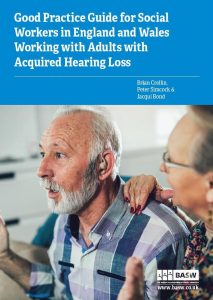Social workers make a unique contribution to making the world a better place, but doing so requires a range of knowledge and skills. But what specific knowledge and skills are needed when working with the increasing number of adults with acquired hearing loss?
In this guest blog to mark Deaf Awareness Week, Peter Simcock, Senior Lecturer in Social Work at Birmingham City University and former social worker with deaf people, describes a collaborative project to produce a good practice guide for social workers in England and Wales working with adults with acquired hearing loss.

Peter: As the UK based charity Hearing Link notes, ‘hearing loss affects far more than a person’s ears’. It impacts on people’s health, work, relationships, culture and identity. It impacts on communication, and affects not only the person with the condition but also their partners, families and friends.
While all these matters are of concern to social workers, sensory loss has been somewhat marginalised within the profession, left to a small number of specialist practitioners.
Nevertheless, data on the incidence and prevalence of acquired hearing loss suggest that it is very likely that social workers, particularly those in older people’s services, will work with adults with the condition.


I have been interested in sensory loss for many years. I was therefore delighted to be invited by the British Association of Social Workers (BASW) to join a collaborative project, with Brian Crellin (retired third generation worker with deaf people) and Jacqui Bond (social worker working with deaf people in South Wales).
Together, we have produced a good practice guide on acquired hearing loss, specifically for social workers who are not specialist in the field.
We drew on research findings, practice wisdom and service user and carer expertise, to develop a guide offering useful, practice based advice and information to social workers, within the context of the legal frameworks in England and Wales.
 We begin the guide by defining acquired hearing loss, outlining current incidence and prevalence data, and describing the role of medical assessment. However, for me, the key sections of the guide are those on communication with people with acquired hearing loss and the psychosocial impact of the condition.
We begin the guide by defining acquired hearing loss, outlining current incidence and prevalence data, and describing the role of medical assessment. However, for me, the key sections of the guide are those on communication with people with acquired hearing loss and the psychosocial impact of the condition.
Social workers are known for having strong communication skills, and yet many of these need to be adapted when working with adults with acquired hearing loss, such as the use of silence.
As adult social care departments move to agile working, social workers should be mindful that background noise in open plan offices can affect how the worker interacts over the telephone.
Practitioners may also need to make use of ‘technical aids to communication’ (TACs) and ‘human aids to communication’ (HACS), particularly in meetings (as opposed to one-to-one work) such as care and support planning interventions and review meetings.
In the guide, we offer a range of advice and information about such aids to communication, in addition to providing a list of communication tips.
Of course, it is not only their own skills that social workers need to consider; when commissioning care and support for adults from third sector organisations, practitioners should establish what arrangements are in place for supporting people to access their services using a particular mode of communication.
It is important that social workers are aware that acquired hearing loss has multiple psycho-social effects, which are often more significant than the medical and audiological matters.
Such effects must be considered in social work assessments, in order to consider the impact of acquired hearing loss on people’s desired outcomes and on their well-being.
To support practitioners, we outline the known physical, psychological, emotional, spiritual, social, cultural, relational and vocational effects of hearing loss, and also include specific sections on mental health and hearing loss, and the effects of the condition on family, friends and carers.
We end the guide with a list of contact details of other sources of support and information, and a handy checklist for practitioners.
I strongly believe that social work has much to offer adults with acquired hearing loss, and that their care and support should not be the sole responsibility of our health colleagues in audiology departments.
I hope that the guide will prove to be a useful source of advice and information for both practitioners and adults with acquired hearing loss; I would be delighted to hear of its use by social workers throughout England and Wales.
Leave a comment